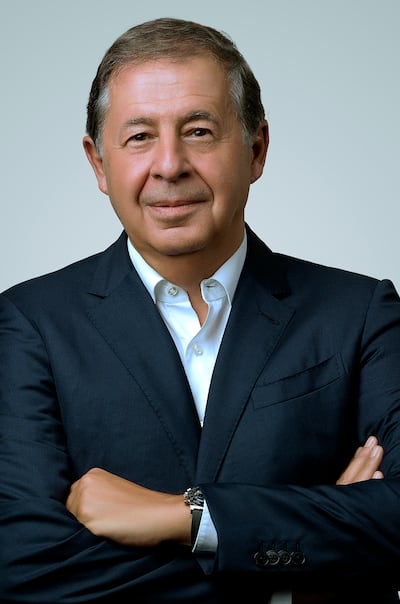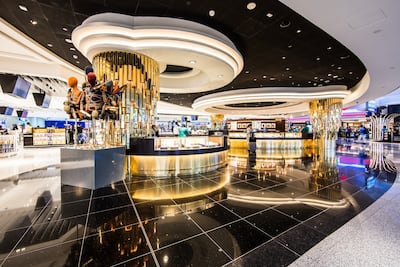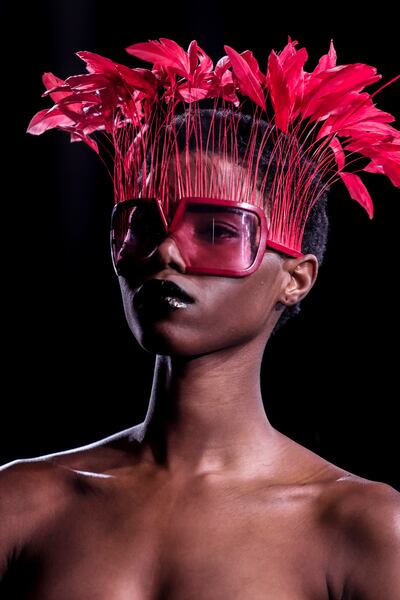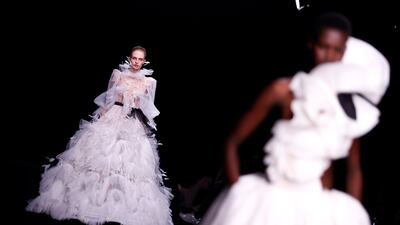In the earnest bustle of the Congress Centre at the World Economic Forum Annual Meeting in Davos, Switzerland, Rachid Mohamed Rachid stands out from the crowd.
He cuts a stylish figure, as befits the chairman of Valentino and Balmain, nailing the tricky Davos business-casual look in soft, dark-hued winter attire.
Rachid, also the founder of Alsara Investment Group, takes his time to answer when asked the eternal question for his industry: can a brand truly call itself luxury if it is available at every airport and in every city centre?
“The balance is very challenging,” he concedes. “So, yes, you want to be seen, you want to be present. But you also want to be exclusive. And I think that's the secret of success in luxury.
“If you lose your balance, either you don't grow, or actually you grow too much in the wrong direction, and then you lose your exclusivity, which means people don't see [the brand] as luxury any more. And unfortunately, some brands have gone through that in the last 20 years,” says the former Egyptian minister of Trade, Industry and Investment.

“Luxury is one of the industries that has been growing consistently in the past 20 years, at rates of between six and eight per cent. This is unusual, it was only probably luxury and technology that were growing at that rate,” he says.
In addition, he says, the luxury market has displayed remarkable resilience. “As we see even today, with the prospect of recession, the performance of luxury is much stronger than the main market because you are catering to consumers who have a higher ability to spend money,” he says.
For Rachid, there is an emotional quality to luxury that goes beyond the bottom line. “For me personally, I love brands, all my life I've been in consumer goods. There is nothing stronger in the manifestation of the strengths of a brand than in luxury … in luxury, marketing is not even giving the consumer what they want. Luxury is just doing it and then the consumer wants it … because that feeling of luxury is an amazing thing. So, the emotional part in luxury is very, very powerful.”
Up until Covid-19, the luxury market had proved immune to wider economic and financial downturns. And with China opening up again this year, a post-pandemic recovery is forecast for the sector. “China's consumption before the pandemic was almost 35 per cent of the global consumption, which was almost equivalent to the US and Europe combined. And that is the whole consumption [of Chinese buyers], meaning inside and outside [the country]. And of course, historically, it started outside of China,” he says.
“Now, with the opening up of China and the lifting of all restrictions, we are hopeful because China dropped like 50 per cent, so now we are hoping that it will come back again into the market, and also the Chinese travellers will come back into the different capitals of the world.
“All the brands, including ourselves, we invested heavily in being present in China. The lockdown there in the last three years … created a very unusual situation for everybody. But the reality is also that there has been a surge in the markets in the US and in Europe, driven by what is called ‘revenge buying’.
“So, people after the pandemic, they just went out, and wanted to spend money and they wanted to buy a lot of things. And rich people, the reality is that after the pandemic, they became richer, and they're spending more money because of the cash around.”

However, the next big opportunity for luxury is not likely be a geographic market, but a demographic of customers born between the mid-1990s and 2010. “Gen Z became one of the main targets for luxury and the consumption of luxury dropped now to an average of mid-20s. Obviously, that means that a lot of marketing, a lot of products, a lot of activities are directed to younger consumers, and that is definitely taking shape in a very, very aggressive way.”
Luxury and tourists “go hand in hand”, he says, which is also where the Gulf and the UAE will benefit. “In the Gulf today, we have more than one centre, in Dubai, Doha, Saudi Arabia, which are targeting more and more tourists … When people travel, they want to buy and they want to buy exclusive.”
This growth and the presence of luxury in the region are also helping to encourage an environment and ecosystem that can support local brands, he says. “It's going to take some time, but it's going to happen.”
Bidayat, an international investment company Rachid founded, supports creative entrepreneurship in the Mediterranean region. “We started with Egypt, and our philosophy and our intention is to take these brands, which have something unique in terms of creativity, to the global scene. We believe you cannot succeed unless you go global in your mind.
"So, from a supply chain point of view, from a manufacturing and quality point of view, communication has to be up to the global standard. And I think you know there is a lot of potential in the region, not only in Egypt … the Gulf, in Lebanon and Morocco and Tunisia. All those countries have really a lot of potential.
“There is a lot of creativity in the region, which is an amazing source of inspiration in terms of culture and in terms of history. And at the same time, we are very close to centres of production … in India or Asia, or in Turkey or Europe.
“To create luxury brands today is almost equivalent to creating global brands; you cannot be luxury and be very limited. So, that creates a little bit of a challenge, really, to move from just an idea to become a real luxury brand.”
Haute couture, for Rachid, is the ultimate luxury when it comes to fashion, and analyst forecasts say the segment will show steady growth over the next five years. “So if you go to an haute couture fashion show, which is usually in Paris, I mean, this is art, this is the ultimate art. Some of the pieces will never be sold, but are made really to express the art of it.

“Some of the pieces are going all the way up to half a million euros or a million euros, and they don't end up being used, but represent the highest presentation, creation, fashion and manufacturing.”
The next push for haute couture will be into "made to measure", he says. “Ready-to-wear is the expression of haute couture in a democratic way … made to measure is an extension, getting nearer to haute couture.”
As the industry changes, sustainability has become an important topic, he says, with both positive and negative connotations. “Negative because, unfortunately, we have seen with the surge of what was called ‘fast fashion’, there has been a lot of pushback against the fashion business, because of the negative impact on sustainability. But at the same time, most companies, and in our case, all our companies, have sustainability portfolio programmes. We are part of what is called the Green Fashion Initiative; we are seeking all the time now to look at raw materials that are going to be recycled, [and] the tracing of our products is becoming more and more important.
“Even the idea today, which was not even thought about before, to resell products, like second-hand luxury, it's picking up dramatically in the world.”
Contrary to what people say, “we luxury companies, we are supporting that, we are not against it.
“To be able to have a piece of luxury clothing and going on the market to sell it back again … this is a positive thing, not only because it's good for the environment and sustainability, but even from a value preservation point of view. So if people feel they can buy something that can maintain its value for the long term, it's also very good for the environment and for the market.”
Overall, Rachid says he is optimistic about the Middle East region this year, especially with stable oil prices for Gulf economies, and the expectation that interest rates have plateaued and could reduce for other countries in the region needed to raise funds internationally.


